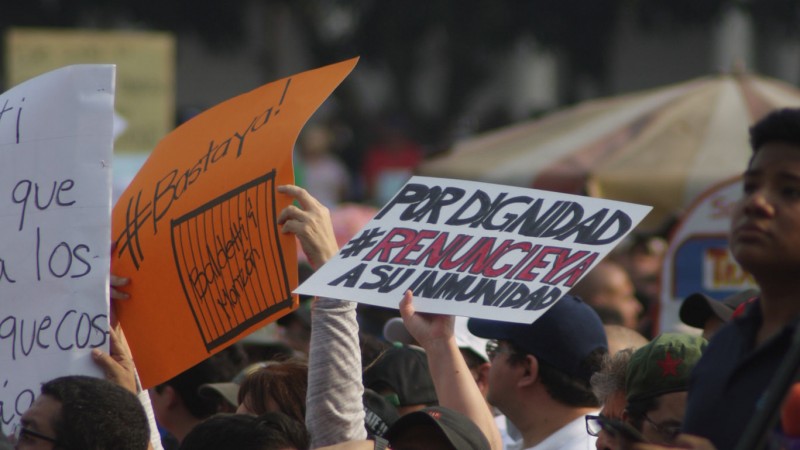
Protests in Guatemala against government corruption on April 25, 2015. Photo by Flickr user Surizar published under a Creative Commons Attribution Non Commercial license.
Less than a week after Guatemalan Vice President Roxana Baldetti resigned amid a corruption investigation, the Guatemalan Congress elected Alejandro Maldonado Aguirre, former jurist and politician from the country's conservative right, as the new vice president.
He will serve until January 14, 2016.
@CongresoGuate aprueba acuerdo para declarar a Alejandro Maldonado como Vicepresidente. 118 a favor y 29 en contra. #NuevoVice
— PlazaPública en Vivo (@PzPenVivo) May 14, 2015
Guatemalan Congress approves Alejandro Maldonado Aguirre as the next vice president. With 115 votes in favor and 29 against.
His election on Thursday, May 14, 2015, sparked a huge controversy among different sectors, especially those working in transitional justice. Maldonado Aguirre was the judge leading the effort to save former dictator Efrain Ríos Montt from his genocide sentence. He was the one declaring the Guatemalan genocide trial invalid.
Ríos Montt and his then head of military intelligence Mauricio Rodriguez Sanchez are charged with genocide and crimes against humanity for massacres committed in 1982 and 1983. Prosecutors allege that Rios Montt was responsible for the killing of 1,771 indigenous Mayans, the displacement of 29,000, and the rape and torture of others during 15 massacres. Ríos Montt is due to be retried, but it is not certain when proceedings will get underway.
Maldonado Aguirre's election stirred up heated reactions online.
Ya tenemos un nuevo vicepresidente para gritarle: vos también #renunciaYa porque #SiHuboGenocidio
— Lucha (@liberalucha) May 14, 2015
We have a new vice president to shout at: You must resign because yes, there was a genocide.
Impunity alive & well in #Guatemala. New VP was one of judges who torpedoed the #genocide conviction of #RiosMontt https://t.co/xbaXghUtbG
— Jo-Marie Burt (@jomaburt) May 14, 2015
OPM y su gobierno han sido además de corruptos, represores y han negado que #SiHuboGenocidio, apoyados x las mismas estructuras en el OJ — Las venas abiertas (@KimyOrion) May 14, 2015
OPM [Otto Perez Molina, current president go Guatemala] and his government have been, on top of corrupt, repressive, denying that yes, there was a genocide, supported by the same structures inside the Ministry of Justice.
Former Vice President Roxana Baldetti resigned on May 8 after her closest aide was linked to a big government corruption scheme, known as La Linea. The investigation is still unfolding, with Baldetti stripped of her immunity and two judges potentially involved.
As the new vice president was elected, good news arrived from Switzerland, where Guatemala's ex-police chief Erwin Sperisen got a life sentence for the extrajudicial killings of Guatemalan citizens. The case was prosecuted in Switzerland (Sperisen is a Swiss-Guatemalan dual national) proving how hard is to achieve justice where the judiciary is so close to the powerful.
Philip Grant, the director of TRIAL (Track Impunity Always), whose goal is to put the law at the service of the victims of international crimes (genocide, crimes against humanity, war crimes, torture and forced disappearances), mentioned the role played by the International Commission against Impunity in Guatemala (CICIG) in this case:
Today’s ruling in the #Sperisen case: a powerful recognition of @CICIG’s mandate and struggle against impunity in #Guatemala
— Philip Grant (@PhilipGrant40) May 12, 2015
As citizens take in the news of the appointment, protests are likely to continue online and in the streets in the following weeks and months. The people continue to demand increased justice and accountability, an investigation into the president for suspected crimes against humanity during the 1980s and the president's resignation. Popular sentiment is that no political party is bringing about real change, therefore citizens cannot rely on their elected representatives and must take to the streets, pick up a banner and megaphone and scream, “Enough is enough”.
The Guatemala human rights commission called attention to a planned nationwide protest in the coming days:
Despite the removal of #Baldetti, citizens in #Guatemala will move forward with a nationwide protest set for May 16 https://t.co/nXYFKRuoP5
— GHRC/USA (@GHRCUSA) May 13, 2015







5 comments